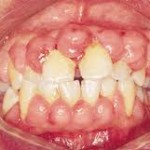 Hormone induced Gingival enlargement
Hormone induced Gingival enlargement
What is gingival enlargement?
Gingival enlargement simply means that there is an increase in the size of your gingival/gums.
What are the causes of gingival enlargement?
There are several reasons why your gums are enlarged.
1)Â Â Â Â Â Inflammation
2)Â Â Â Â Â Drug induced.
Certain drugs such as calcium channel blockers, anticonvulsant drugs can cause the enlargement of your gums. Read here for more information on drug induced gingival enlargement. http://www.intelligentdental.com/2012/01/01/drug-induced-gingival-enlargement/
3)Â Â Â Â Â Systemic diseases such as leukemia, granulomatous disease and etc.
4)Â Â Â Â Â Hormone induced.
5)Â Â Â Â Â Neoplastic enlargement due to benign or malignant gingival tumors.
6)Â Â Â Â Â False gingival enlargement.
Â
Puberty and periodontal tissues                                                                                   Â
- Puberty is the process of physical changes by which a child’s body matures into an adult body. There will be certain changes in your physical appearance and behavior. Puberty occurs between the average ages of 11 to 14 in most women and around the age of 13 in men. The two major sex hormones involved during puberty are testosterone in males and estrogens in females. During puberty, periodontal tissues may have an exaggerated response to local factors such as plaque accumulation. Gingival enlargement often occurs in areas where plaque and calculus are accumulated and this occurs in both male and female. The size of gingival enlargement may reduce after puberty but does not disappear until adequate plaque control is achieved.Â
Clinical features of gingival enlargement during puberty
-Â Â Â Â Â Â Â Â Â Gingival enlargement often present in the interproximal area (between teeth) or the marginal gingival (gum margins)
-Â Â Â Â Â Â Â Â Â Gingival enlargement often affects the facial gingival (outer surface) and the lingual surfaces (inner surface) are relatively unaffected.
Treatment for gingival enlargement (during puberty)
 -      Good plaque control and removal of local factors (for example, over hanging restorations etc)
-Â Â Â Â Â Â Â Â Â If gingival enlargement persists , gingivectomy (removal of excess gingival tissues )can be done on patient.
Below are some brief explanations on how gingivectomy is performed.
1. The periodontal specialist (peridontitist) will mark the apical limit of your periodontal pocket (which is the deepest part of your periodontal pocket) using a special instrument. .
2.      Then, he will perform a continuous incision using a special scalpel/knife. This incision will be made 45 degrees to the base of your periodontal pocket. Excess tissue can be removed using a curette or scaler and hence a satisfactory gingival contour can be produced.
3.      After the surgery, you will be asked to avoid : (i) eating or drinking for one hour.
                                                                                                       (ii) taking hot drinks for the 1st day
                                                                                                       (iii) smoking during the healing process
                                                                                                        (iv) touching/playing the surgical site with your tongue.
-take any pain killers if there is pain when the anesthetic wears off.
– rinse your mouth with warm salt water or 0.2% Chlorhexidine mouthwash for its antibacterial action.
– Use a soft toothbrush and brush on the non surgical area.
– Inform the dental specialist if you are experiencing any extensive pain, swelling or bleeding                   Â
Pregnancy and periodontal tissues
The incidence of gingivitis is higher during pregnancy , especially during the third month of gestation.
-Â Â Â Â Â Â Â Â Â Your gingival or gums may become bright red, swollen, sensitive and can bleed easily.
-Â Â Â Â Â Â Â Â Â This condition might be associated with the increased levels of hormones (oestrogen, progesterone) Â
-Â Â Â Â Â Â Â Â Â This condition may resolve partially or completely after parturition.
-Â Â Â Â Â Â Â Â Â High maintenance of oral hygiene and removal of plaque retentive factors are necessary to prevent and control gingivitis in pregnant women.